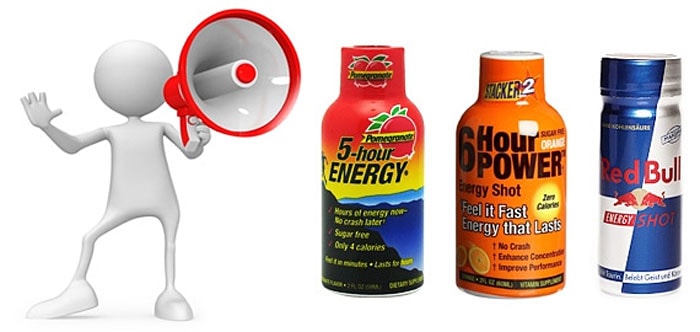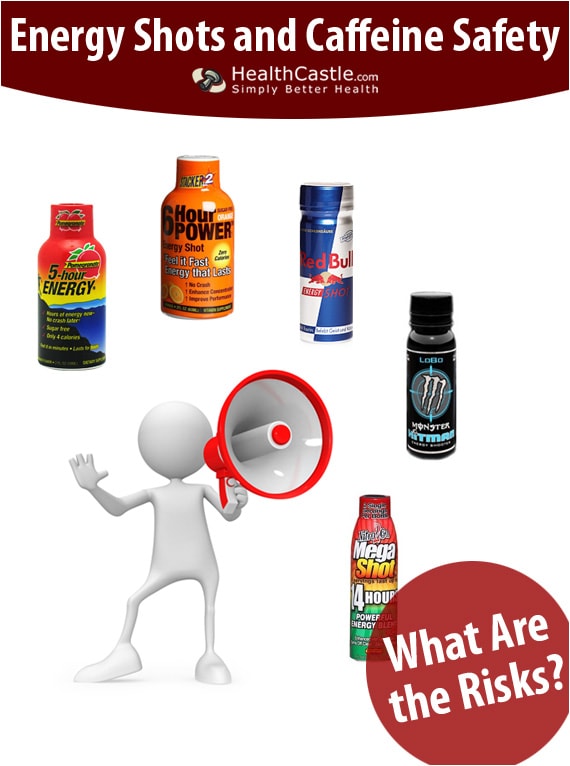
Written By: Sofia Layarda, MPH
Title: Master of Public Health
Alumni: University of California, Berkeley
Last Updated on:


In the quest for ever increasing energy levels, some are turning to so-called energy shots which have caffeine added. A Consumer Reports article summarized a variety of energy shots that ranged from 6 mg caffeine per serving all the way up to 242 mg caffeine. What can one find in these energy shots and are there safety issues?

Table of Contents
Some products specify the source of their caffeine. CLIF urbo Energy Gel, for example, uses green tea extract. Some products use guarana, which is a plant that is naturally high in caffeine. Of particular concern, some products combine stimulant ingredients (in addition to caffeine) all in one. Rockstar Energy which contains both panax ginseng root extract and guarana seed extract, clock in at 200 mg caffeine per 2.5oz serving while Monster Hitman which has ginseng, guarana and taurine as well as a whole slew of other ingredients clocks in at 240 mg per 3-oz serving.
Many energy shots include vitamins – usually B vitamins. Some include very high doses of B-vitamins, well in excess of the recommended daily intake levels. Monster Hitman, for example, proudly claims to contain 200% of the Daily Value for several B-vitamins.
While B-vitamins are water-soluble and excess amounts can be excreted through urine, regular excess doses of any vitamins are not recommended.
Studies that have looked at the effects of amino acids such as taurine show mixed results. Some suggest it may improve athletic performance or mental performance but the results are not conclusive. More importantly, very little is known about the effect of excessively high doses of taurine.
Depending on the product, the sweetener could be sugar, corn syrup, or artificial sweetener. 5-Hour Energy, for example, contains sucralose. Some, such as Rockstar Energy, contain both acesulfame potassium and sucralose. Some products, like CLIF Shot Energy Gel, go as far as using organic dried cane syrup .
Many products also contain the nondescript “artificial or natural flavors”, as well as preservatives such as potassium citrate or potassium sorbate.
If you need a quick energy replenishment, go for a cup of brewed coffee instead of these energy shots. It’s natural, full of antioxidants, with hardly any artificial ingredients, and have been proven to be good for you. The concern with using energy shots is that the amount of caffeine you can consume can easily exceed what is considered safe. Energy shot is typically sold in a 2 to 3-oz container: much smaller than a can of regular soft drink or energy drink (8 oz).
To put it in perspective, an espresso shot (1 fl oz) is 30 to 50 mg caffeine. A cup of drip coffee has anywhere between 65 mg and 200 mg, depending on the amount of coffee used. A typical 8-oz cup of premium coffee contains close to 200 mg. Generally, the recommendation is to stay to about 200-300 mg caffeine per day. If you drink energy shots in addition to other sources of caffeine such as soda, coffee or tea, you can easily exceed the safe threshold. Too much caffeine raises your heartbeat, blood pressure, and may lead to vomiting, nausea, or nervousness.
Alumni: University of California, Berkeley – Sofia believes in bringing back fun and pleasure into everyday eating. She loves cooking, and is constantly experimenting with ingredients, creating recipes and trying them out on family and friends. Her latest interest lies in finding realistic and practical ways of environmentally-friendly food/eating habits.
amino acid, caffeine, men's nutrition, sports nutrition, vitamin b